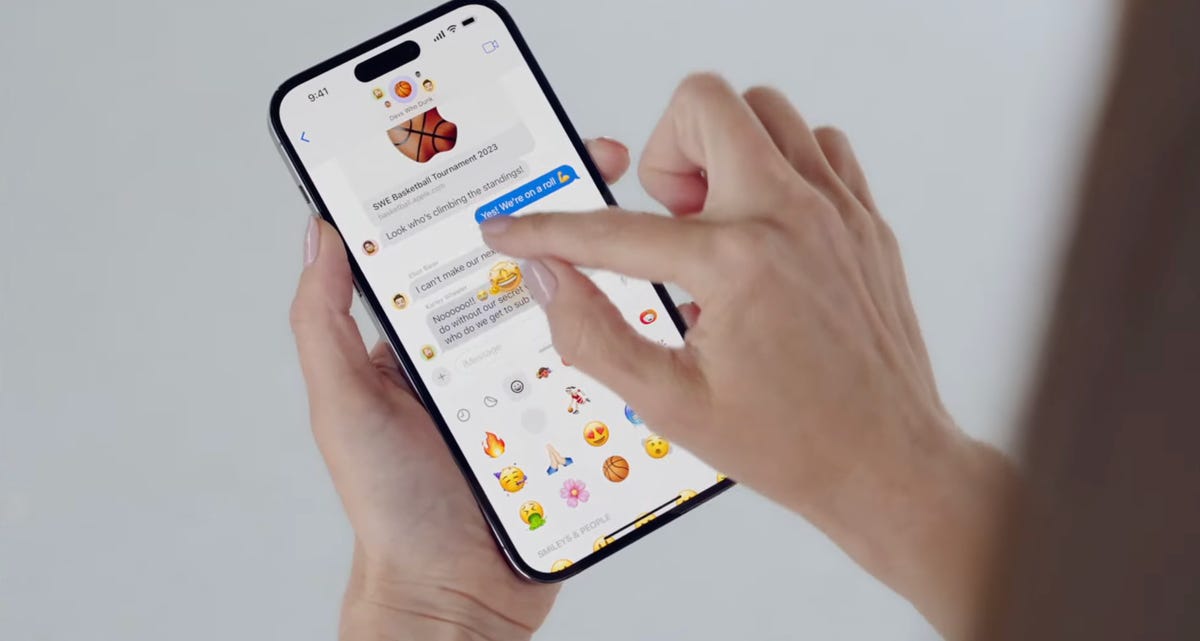There’s good news and bad news for iPhone owners with Android friends. First the bad: Apple will probably never bring iMessage to Android. But on the bright side, it doesn’t need to.
It’s impossible to speak in absolute terms without knowledge of Apple’s future plans. But given the company’s general product strategy, attention to privacy, and that iMessage is among the reasons some Android owners switch to the iPhone, the chances of Apple expanding its popular messaging service to its main competitor seem slim.
Yet there’s a glimmer of hope for those of us with friends and family members who prefer the opposite operating system. Apple confirmed that next year it will support the Rich Communication Standard for texting, or RCS, meaning some of the biggest issues with cross-platform texting will soon improve. That means you’ll no longer have to settle for texting distorted videos to your green-bubble buddies.
Read more: Best iPhone of 2023
We were reminded yet again of the blue bubble vs. green bubble divide recently when Apple started cracking down on apps like Beeper Mini that provide iMessage-like features on Android through workarounds. The fact that these apps exist to begin with, and that Beeper Mini made it into the top 25 free Android apps just days after its launch, according to Sensor Tower, serve as another sign that the basic texting experience between iPhone and Android is in need of an upgrade.
Just don’t expect Apple to fix it by bringing iMessage to Android.
Texting features that should be universal
It may be an understatement to say chatting with an Android user through the iPhone’s default messaging app is a subpar experience compared to texting other iPhone users. And I’m not just talking about the color of the bubbles, which has been well documented.
Videos look smaller and distorted when sent to an Android device from an iPhone. There’s also no typing indicator to show when the person you’re texting is responding to your last message. You don’t have the option to turn on read receipts, and you can’t see whether your text was actually delivered.
In 2023, these features should be universal rather than positioned as a platform-specific benefit. As someone with many Android-loving friends, I often find myself turning to third-party chat apps like WhatsApp, Google Chat and Discord for group conversations. These apps offer consistent experiences no matter which phone you have, unlike your phone’s built-in messages app, which uses the aging SMS (Short Message Service) and MMS (Multimedia Messaging Service) protocols for exchanges between iPhone and Android.

Apple continually updates iMessage with new features through new versions of iOS.
Apple has certainly opened up its walled garden in recent years. It brought FaceTime to Android with iOS 15 in 2021 by allowing non-iPhone users to join a video call through a shared link. Just a year earlier, 2020’s iOS 14 update brought the option for iPhone owners to change their default email and web browser apps for the first time.
But iMessage is different. Since its launch in 2011, iMessage has grown into more than just a messaging app. It’s almost its own miniature operating system, with everything from the ability to send cash to other iPhone users to location sharing tools to compatibility with popular apps like IMDb, Yelp and TikTok. It’s Apple’s version of a so-called “super-app,” a term used to describe apps like WeChat that serve as portals to other services in addition to functioning as communication platforms.
It’s unreasonable to expect Apple to bring an experience like this to Android. Many iMessage features have become a core part of the iPhone experience — like SharePlay for listening to music with other iPhone owners, custom stickers that you can create from any photo in your library, and, of course, Memojis.
These features aren’t essential by any means, but they give the iPhone personality and flair. Why should Apple bring that to Android? RCS support feels like the perfect middle ground, as it provides a more modern texting experience without bringing iMessage to Android.
“I would think that [Apple] would keep iMessage as their own,” said Bob O’Donnell, president and chief analyst at Technalysis Research. “They will keep a few interesting little tricks and clever things that they do on their own, and then they will bring some of the core base functionality … and integrate that in.”

